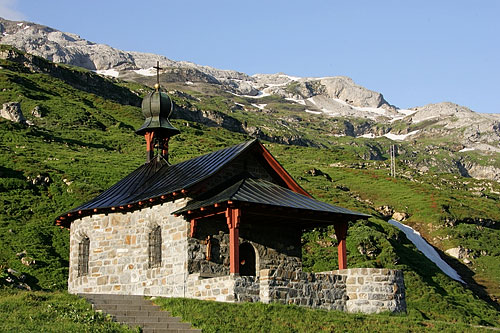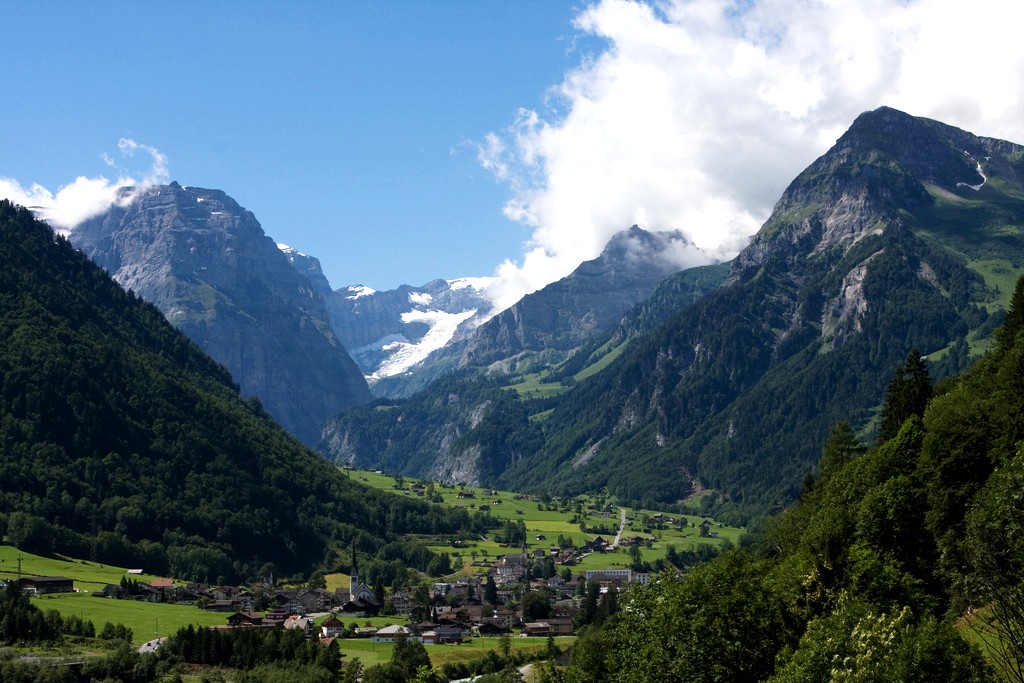|
Urnerboden
The Urnerboden is a village in the high valley of Urner Boden, and also an alp and a small high Alpine permanent settlement in the Swiss canton of Uri. At in length, it is believed to be the largest alp in Switzerland. It forms a disconnected part of the municipality of Spiringen, separated from the rump of that municipality by some of the municipality of Unterschächen and by the Klausen Pass. The Urner Boden is traversed by the eastern approach road to the Klausen Pass to the west, from the village of Linthal in the canton of Glarus. The Klausen Pass provides the only direct connection to the rest of the municipality of Spiringen and canton of Uri that lie to the west of the pass. The pass road is normally closed between October and May, and during this period the Urner Boden is only accessible from the east via Linthal, involving a road journey between the two halves of the municipality of some . In summer, PostBus Switzerland PostAuto Switzerland, PostBus Ltd. (kno ... [...More Info...] [...Related Items...] OR: [Wikipedia] [Google] [Baidu] |
Klausen Pass
Klausen Pass (German: ''Klausenpass''; elevation: ) is a high mountain pass in the Swiss Alps connecting Altdorf in the canton of Uri with Linthal in the canton of Glarus. Somewhat unusually, the boundary between the two cantons does not lie at the summit of the pass, but some down the slope towards Linthal, with the summit being in Uri. The Klausen Pass is crossed by a paved road, which has a length, between Altdorf and Linthal, of . The road approaches the summit from Altdorf via the Schächen Valley communities of Bürglen, Spiringen and Unterschächen, and descends to Linthal via the Urnerboden. The road is normally closed between October and May, due to the high snowfall on the pass. During the open period, a PostBus Switzerland service crosses the pass several times a day, connecting Fluelen station, on the Gotthard railway and Lake Lucerne, with Linthal station, the terminus of the railway line through Glarus. At the top of the pass is a historic chapel, the ''Br ... [...More Info...] [...Related Items...] OR: [Wikipedia] [Google] [Baidu] |
Linthal, Glarus
Linthal is a village, and former municipality, in the municipality of Glarus Süd and canton of Glarus in Switzerland. The village lies near the head of the valley of the Linth river, and at the foot of the Klausen Pass into the canton of Uri. It is the terminus of the railway line that traverses the length of Glarus. History Linthal is first mentioned in 1289 as ''Lintal''. In 1879, Linthal was connected to the Swiss railway network by the opening of the Swiss Northeastern Railway line from Weesen. The road over the Klausen Pass was built between 1895 and 1900. Construction of the Linth–Limmern hydro-electric power scheme, in the mountains above Linthal, commenced in 1957, and was fully operational by 1968. In 2011, the municipality of Linthal was merged into the new municipality of Glarus Süd. Geography The village Linthal lies at the head of the valley of the Linth river, at an altitude of approximately . It is surrounded by mountains, including Ortstock (), Clariden ... [...More Info...] [...Related Items...] OR: [Wikipedia] [Google] [Baidu] |
Switzerland
). Swiss law does not designate a ''capital'' as such, but the federal parliament and government are installed in Bern, while other federal institutions, such as the federal courts, are in other cities (Bellinzona, Lausanne, Luzern, Neuchâtel, St. Gallen a.o.). , coordinates = , largest_city = Zürich , official_languages = , englishmotto = "One for all, all for one" , religion_year = 2020 , religion_ref = , religion = , demonym = , german: Schweizer/Schweizerin, french: Suisse/Suissesse, it, svizzero/svizzera or , rm, Svizzer/Svizra , government_type = Federalism, Federal assembly-independent Directorial system, directorial republic with elements of a direct democracy , leader_title1 = Federal Council (Switzerland), Federal Council , leader_name1 = , leader_title2 = , leader_name2 = Walter Thurnherr , legislature = Fe ... [...More Info...] [...Related Items...] OR: [Wikipedia] [Google] [Baidu] |
Canton Of Uri
The canton of Uri (german: Kanton Uri rm, Chantun Uri; french: Canton d'Uri; it, Canton Uri) is one of the 26 cantons of Switzerland and a founding member of the Swiss Confederation. It is located in Central Switzerland. The canton's territory covers the valley of the Reuss between the St. Gotthard Pass and Lake Lucerne. The official language of Uri is (the Swiss variety of Standard) German, but the main spoken dialect is the Alemannic Swiss German called . Uri was once the only canton whose children in school had to learn Italian as their first foreign language, but in the school year of 2005/2006, that was changed to English, as in other Central and Northeastern Swiss cantons. The canton's population is about 35,000, of which 3,046 (or 8.7%) are foreigners. The legendary William Tell is said to have hailed from Uri. The historical landmark Rütli lies within the canton of Uri. Name The name of the valley is first mentioned in the 8th or 9th century, in the Latinized f ... [...More Info...] [...Related Items...] OR: [Wikipedia] [Google] [Baidu] |
Spiringen
Spiringen is a village and a Municipalities of Switzerland, municipality in the canton of Uri in Switzerland. The municipality comprises two disjoint areas, separated by the Unterschächen, municipality of Unterschächen and the Klausen Pass. The western area includes the village of Spiringen in the Schächen Valley, whilst the eastern area includes the Urner Boden alp above Linthal, Glarus, Linthal and the canton of Glarus. Geography Spiringen has an area, , of . This area is split into two parts, with the slightly smaller part around the village of Spiringen in the valley of the Schächen, which drains westward towards the Reuss (river), Reuss and Lake Lucerne. This part is surrounded by the municipalities of Bürglen, Uri, Bürglen and Schattdorf to the north and west, and the municipality of Unterschächen to the east and south. Some away, on the eastern side of Unterschächen and the Klausen Pass, is the second and larger part of the municipality. This comprises the Urner Bode ... [...More Info...] [...Related Items...] OR: [Wikipedia] [Google] [Baidu] |
Alpine Pasture
Alpine transhumance is transhumance as practiced in the Alps, that is, a seasonal droving of grazing livestock between the valleys in winter and the high mountain pastures in summer (German ' from the term for "seasonal mountain pasture", '). Transhumance is a traditional practice that has shaped much of the landscape in the Alps, as without it, most areas below would be forests. While tourism and industry contribute today much to Alpine economy, seasonal migration to high pastures is still practiced in Bavaria, Austria, Slovenia, Italy, France and Switzerland, except in their most frequented tourist centers. In some places, cattle are taken care of by local farmer families who move to higher places. In others, this job is for herdsmen who are employees of the cooperative owning the pastures. Most Alpine pastures are below ; all are below . The higher regions not suitable for transhumance are known as the High Alps. Etymology The German word ''Alp'' or ''Alm'' (meaning "sea ... [...More Info...] [...Related Items...] OR: [Wikipedia] [Google] [Baidu] |
Canton Of Uri
The canton of Uri (german: Kanton Uri rm, Chantun Uri; french: Canton d'Uri; it, Canton Uri) is one of the 26 cantons of Switzerland and a founding member of the Swiss Confederation. It is located in Central Switzerland. The canton's territory covers the valley of the Reuss between the St. Gotthard Pass and Lake Lucerne. The official language of Uri is (the Swiss variety of Standard) German, but the main spoken dialect is the Alemannic Swiss German called . Uri was once the only canton whose children in school had to learn Italian as their first foreign language, but in the school year of 2005/2006, that was changed to English, as in other Central and Northeastern Swiss cantons. The canton's population is about 35,000, of which 3,046 (or 8.7%) are foreigners. The legendary William Tell is said to have hailed from Uri. The historical landmark Rütli lies within the canton of Uri. Name The name of the valley is first mentioned in the 8th or 9th century, in the Latinized f ... [...More Info...] [...Related Items...] OR: [Wikipedia] [Google] [Baidu] |
Unterschächen
Unterschächen is a municipality in the canton of Uri in Switzerland, situated in the upper Schächental. Geography Unterschächen has an area, , of . Of this area, 35.6% is used for agricultural purposes, while 9.4% is forested. Of the rest of the land, 0.8% is settled (buildings or roads) and the remainder (54.2%) is non-productive (rivers, glaciers or mountains). , 5.6% of the total land area was heavily forested, while 2.1% is covered in small trees and shrubbery. Of the agricultural land, 4.3% is used for orchards or vine crops and 31.3% is used for alpine pastures. Of the settled areas, 0.3% is covered with buildings, and 0.5% is transportation infrastructure. Of the unproductive areas, 0.5% is unproductive flowing water (rivers), 40.4% is too rocky for vegetation, and 13.2% is other unproductive land. [...More Info...] [...Related Items...] OR: [Wikipedia] [Google] [Baidu] |
Canton Of Glarus
The canton of Glarus (german: Kanton Glarus rm, Chantun Glaruna; french: Canton de Glaris; it, Canton Glarona) is a canton in east central Switzerland. The capital is Glarus. The population speaks a variety of Alemannic German. The majority of the population (81%) identifies as Christian, about evenly split between Protestants and Catholics. History According to legend, the inhabitants of the Linth Valley were converted to Christianity in the 6th century by the Irish monk Saint Fridolin, the founder of Säckingen Abbey in what is now the German state of Baden-Württemberg. From the 9th century, the area around Glarus was owned by Säckingen Abbey, the town of Glarus being recorded as ''Clarona''. The Alemanni began to settle in the valley from the early 8th century. The Alemannic German language took hold only gradually, and was dominant by the 11th century. By 1288, the Habsburgs had claimed all the abbey's rights. Glarus joined the Old Swiss Confederacy in 1352 as one of t ... [...More Info...] [...Related Items...] OR: [Wikipedia] [Google] [Baidu] |
PostBus Switzerland
PostAuto Switzerland, PostBus Ltd. (known as in Swiss Standard German (), in Swiss French (), in Swiss Italian (), and in Romansh () is a subsidiary company of the Swiss Post, which provides regional and rural bus services throughout Switzerland, and also in France, Germany, and Liechtenstein. The Swiss PostAuto service evolved as a motorized successor to the stagecoaches that previously carried passengers and mail in Switzerland, with the Swiss postal service providing postbus services carrying both passengers and mail. Although this combination had been self-evident in the past, the needs of each diverged towards the end of the twentieth century, when the conveyance of parcels was progressively separated from public transportation. This split became official with the conversion of PostAuto into a separate subsidiary of the Swiss Post in February 2005. The buses operated by PostAuto are a Swiss icon, with a distinctive yellow livery and three-tone horn. The company uses ... [...More Info...] [...Related Items...] OR: [Wikipedia] [Google] [Baidu] |




